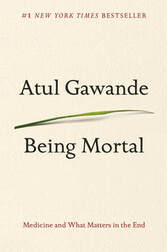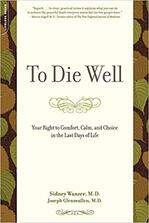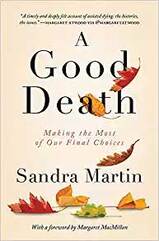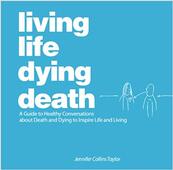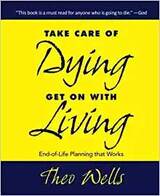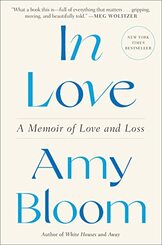 by Amy Bloom Random House (March 8, 2022) ISBN: 978-0593243947 I am inclined to call this book a “page-turner”. But how can that be? It is a book about the author’s husband, Brian, who, by the time he is diagnosed with Alzheimer’s disease, is also told that the process of sinking into severe dementia will be rapid. This vibrant man in his 50s is determined to end his life while he still recognizes and can interact with his wife and those he loves. Book Review: This is Assisted Dying: A Doctor’s Story of Empowering Patients at the End of Life4/26/2022
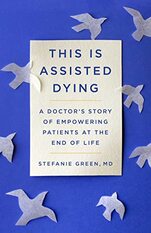 by Green, Stefanie, M.D. Scribner (March 29, 2022) ISBN: 166800478X Dr. Stefanie Green, president of the Canadian Association of MAID Assessors and Providers (CAMAP) opens her book with the question, “What if you could decide, at the end of your life, exactly when and where your death would happen? What if, instead of dying alone, in the middle of the night, in a hospital bed, you could be at home at a time of your choosing?” |
Being Mortal
by Atul Gawande Medicine has triumphed in modern times, transforming birth, injury, and infectious disease from harrowing to manageable. But in the inevitable condition of aging and death, the goals of medicine seem too frequently to run counter to the interest of the human spirit. Nursing homes, preoccupied with safety, pin patients into railed beds and wheelchairs. Hospitals isolate the dying, checking for vital signs long after the goals of cure have become moot. Doctors, committed to extending life, continue to carry out devastating procedures that in the end extend suffering. Gawande, a practicing surgeon, addresses his profession's ultimate limitation, arguing that quality of life is the desired goal for patients and families. Gawande offers examples of freer, more socially fulfilling models for assisting the infirm and dependent elderly, and he explores the varieties of hospice care to demonstrate that a person's last weeks or months may be rich and dignified. Full of eye-opening research and riveting storytelling, Being Mortal asserts that medicine can comfort and enhance our experience even to the end, providing not only a good life but also a good end. To Die Well: Your Right to Comfort, Calm, and Choice in the Last Days of Life
by Sidney Wanzer, M.D. and Joseph Glenmullen, M.D. The information in To Die Well is both comforting and empowering. Knowing our rights to refuse treatment, as well as legal ways to bring about death if pain or distress cannot be alleviated, will spare us the frightening helplessness that can rob our last days of meaning and connection with others. Drs. Sidney Wanzer and Joseph Glenmullen do not shy away from controversy. They make clear what patients should expect of their doctors, including the right to sufficient pain medication even if it shortens life. They distinguish between normal sadness and depression. They also explain the ways to hasten death that are legal and possible for anyone, and those that require a doctor's help. A Good Death: Making the Most of Our Final Choices
by Sandra Martin A Good Death is timely, engaging and inspiring. In taking on our ultimate human right, award-winning journalist Sandra Martin charts the history of the right to die movement here and abroad through the personal stories of brave campaigners like Sue Rodriguez, Brittany Maynard and Gloria Taylor. Martin weighs the evidence from permissive jurisdictions such as the Netherlands, Oregon, California, Switzerland and Quebec and portrays her own intellectual and emotional journey through the tangled legal, medical, religious and political documentation concerning terminal sedation, slippery slopes, and the sanctity of life. Modern death has become a wrenching political dilemma, one that becomes more pressing as the population ages. A Good Death confronts our fears about dying, our struggle for meaning, and our dread of being trapped by voracious medical technology in a nightmare world that has abandoned caring in pursuit of curing, no matter the cost or the suffering to patients and their families. A Good Death asks the tough question none of us can avoid: How do we want to die? The answer will change your life-and your death. "Living Life Dying Death; A Guide to Healthy Conversations about Death and Dying"
by Jenifer Collins Taylor While some see death and dying as taboo subjects, author Jennifer Collins Taylor, MSW approaches the topics with gentle, thought-provoking prose, demonstrating that openly discussing death and dying is as important to the living as it is to those who may be nearing their final breaths. Her book, Living Life Dying Death: A Guide to Healthy Conversations About Death and Dying to Inspire Life and Living, accomplishes its mission through reflective conversation starters that encompass topics such as compassion, dreams, fear, goodbye, gratitude, grief, honesty, hope, humor, joy, mystery, pain, patience, peacefulness, philosophy of life, relationships, spirituality and many more. Most importantly, the book emphasizes that love is triumphant. In times of health readers are encouraged to reflect on, explore and express their beliefs on the very nature of life and living, death and dying. In times of health challenges the book can be used as a guide to initiate difficult conversations when faced with the possible decline and death of self, friend or loved one. In times of grief this book can be used to bring support and hope to the dynamic experience of grieving. Regardless of where readers are on the pathway from life to death, Living Life Dying Death should be readily available to guide, encourage and inspire healthy conversations about death, dying, grief and loss. Living Life Dying Death calls readers to action, prompting them to find the courage and confidence to more openly discuss death, dying, grief and loss. This book stimulates the reader to embrace living well and encourages those approaching life's final journey to trade fear for love, comfort, forgiveness and a sense of awe. Courageous conversations about life and death allow the strength and beauty of the human spirit to shine. Take Care of Dying---Get On with Living: End-of-life Planning that Works
by Theo Wells The greatest gift you can give your family and friends is your carefully thought out plan for handling the unexpected events at the end of your life. Here—all in one place—are the basic decisions you need to make as long as you’re living: |
Proudly powered by Weebly

